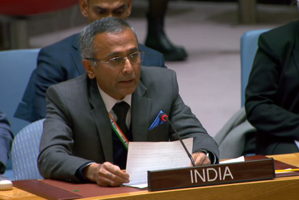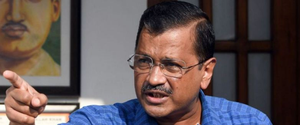United Nations : The spillover of the Israel-Hamas conflict to “the vicinity of India” with attacks on shipping by Houthi rebels has an impact on India’s economic interests, according to Deputy Permanent Representative R. Ravindra.
The conflict’s impact on the safety of commercial shipping in the Indian Ocean “has a direct bearing on India’s own energy and economic interests”, he said on Tuesday at a high-level meeting of the Security Council on the situation in the Middle East.
He said some of the attacks were happening “in the vicinity of India” and “this fraught situation is not to the benefit of any party, and this must be clearly recognised,” he said.
Ravindra did not name the Yemeni Houthi rebels who are carrying out the attack or specifically mention the Red Sea around where the incidents have taken place.
The Houthi rebels have said that they are attacking ships as an act of solidarity with the Palestinians under attack from Israel in Gaza.
The Red Sea forms the link for the Arabian Sea and the Indian Ocean to the Suez Canal, the main link for India and Asia to areas of the Middle East, Europe and beyond.
India’s Navy has said that it was “surging” its presence in the region and earlier this month one of its ships acted to protect a commercial ship under attack.
France, the president of the Security Council for this month, convened the high-level meeting presided over by Foreign Minister Stephane Sejourne with the participation of about 15 foreign ministers, including Russia’s Sergey Lavrov and Iran’s Hossein Amirabdollahian.
Secretary-General Antonio Guterres said that the situation in the Red Sea is “deeply worrying”.
“Houthi attacks are disrupting global trade”, he said, and “these have been followed by airstrikes by the United States and the United Kingdom on Houthi positions in Yemen.”
“De-escalation is essential — and all attacks on merchant and commercial vessels in the Red Sea must cease immediately,” he said.
He said that a two-state solution of independent Israel and Palestine living side-by-side is the only way to end the conflict.
Referring to Israeli Prime Minister Benjamin Netanyahu’s rejection of a two-state solution, he said that it was “unacceptable” and noted that it came against “the strongest appeals from even the friends of Israel, including those sitting around this table”.
“It would exacerbate polarisation and embolden extremists everywhere,” he warned.
Guterres said that 1,200 Israelis and others “were killed in the horrific terror attacks launched by Hamas against Israel, with over 250 people taken hostage” at the start of the conflict.
“Nothing can justify deliberate killing, injuring, kidnapping of civilians, the use of sexual violence against them — or the indiscriminate launching of rockets towards civilian targets,” he said.
The counter-operations launched by Israel have “been heartbreaking and catastrophic for Palestinian civilians in Gaza” where more than 25,000 people, mainly women and children, have reportedly been killed”, he said, reiterating his call for a ceasefire.
Ravindra said that India has “strongly condemned the death of civilians” in the Israel-Hamas conflict which has led to “an alarming humanitarian crisis”.
“There can be no justification for terrorism and hostage-taking,” he said.
India “has a long-standing and uncompromising position against terrorism in all its forms and manifestations”, he said.
Ravindra said that India reiterates “the demand for their immediate and unconditional release” of all hostages taken by Hamas.
He reiterated India’s backing for a two-state solution “where the Palestinian people are able to live freely in an independent country within secure borders with due regard to the security needs of Israel”.
That is the only way for “an enduring peace that the people of Israel and Palestine desire and deserve”, he said.
US Under Secretary of State Uzra Zeya said that President Joe Biden believes that a two-state solution is “the only path to a durable peace, as well as the only guarantor of a secure and democratic Israel”.
Zeya, who is of Indian descent and the highest-ranking Muslim in the Stage Department, said, “A stronger, reformed and revitalised Palestinian Authority that can more effectively deliver for its own people in both the West Bank and Gaza must also be part of the equation”.
Strongly denouncing the Hamas assault on Israel, she said that “we lament” that Russia, which has veto powers, has blocked efforts in the Council to condemn the Hamas terrorist attack..
Facing a tide of criticism of Israel, some of that directed against the US, Zeya also had strong words for Israelis.
“We continue to convey to Israeli leaders that they need to do more to protect civilians and take feasible precautions to minimize civilian harm, in line with international humanitarian law,” she said.
She said the US is “deeply troubled” by the “unprecedented levels of violence by extremist settlers” from Israel and “we condemn killings of Palestinian civilians and we urge Israel to prevent and investigate settler violence, as well as hold perpetrators accountable”.
Outlining the calamitous outcomes of the Israeli attacks on Gaza, Palestine’s Foreign Minister Riyad al-Maliki said, “There are two choices — a spreading fire or a ceasefire”.
He asked that Palestine should be made a full member of the UN, upgraded from its present observer status that does not give it a vote in the General Assembly.
That was echoed by several ministers.
Malaysia Foreign Minister Mohamad Hassan said Palestine should no longer be treated as a “second-class citizen”.
Israel’s Gilad Erdan said that the UN was ineffective in dealing with the problems of the Middle East, offering “aspirin for cancer” instead of going to the root cause of the malaise.
He said “Israelis will face another attempted Holocaust” from the cease-fire demanded by some Council members as it will enable Hamas to regroup and rearm.






Related Posts
S. Korea to deploy more staff as doctors at 5 major hospitals take weekly breaks
Israeli, Hamas delegations to reach Cairo today for talks
‘N.Korea installs mines on inter-Korean road within demilitarized zone’